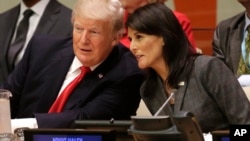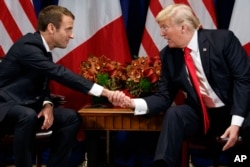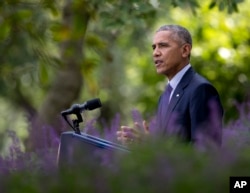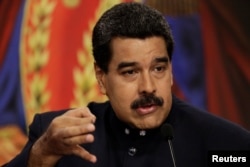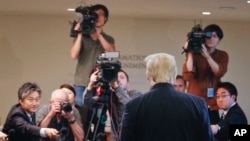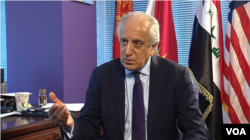U.S. President Donald Trump launched into a whirlwind round of bilateral and multilateral discussions Monday at the beginning of his four-day diplomatic marathon in New York for the annual United Nations General Assembly debate, and many meetings on its sidelines.
In his first U.N appearance Monday morning, a day before the General Assembly session formally opens, Trump presided over a session on reforming the world body and called for bold action to make the 193-member organization “a greater force for peace.”
Flanked by U.N. Secretary-General Antonio Guterres and Washington's U.N. ambassador, Nikki Haley, Trump told the diplomats at the reform meeting that the organization does not perform as well as it should, and that bureaucracy was to blame. He said the world body must “not be beholden” to the ways of the past.
“We seek a United Nations that regains the trust of the people around the world,” Trump said. “In order to achieve this, the United Nations must hold every level of management accountable, protect whistleblowers, and focus on results rather than on process.”
Officials from more than 120 countries were invited to the U.S.-sponsored meeting after agreeing to a 10-point reform plan initiated by the secretary-general.
“The United Nations must become more nimble, effective, flexible and efficient,” Guterres told the meeting. He said the organization's bureaucratic shortcomings keep him awake at night.
One-on-one with Trump
Later in the day, Trump held one-on-one meetings with France's President Emmanuel Macron and Israeli Prime Minister Benjamin Netanyahu, then had dinner with key Latin American leaders.
Briefing reporters after the two bilateral sessions, the State Department's director of policy planning, Brian Hook, said both dealt primarily with Iran's mischievous role in the greater Middle East.
“One of the things that's common to both ... the French and the Israelis, is this deep and abiding concern about Iran's activities in Syria; and broadly, whether it's in Yemen, Syria, Iraq, Lebanon,” Hook told reporters. “One of the things they discussed was not allowing the ‘Lebanization’ of Syria.”
Asked to explain his term “Lebanization,” Hook said: "Iran takes advantage of failed states, and civil wars, and wars generally. It is the kind of environment that is conducive to activating their proxy network, and they are doing that in Syria."
Obama deals unfair to US
The U.S. official said Trump repeatedly voiced concern that the two international deals signed by former President Barack Obama — limiting Iran's nuclear program and pledging to work together with other nations on climate change — were unfair to the United States.
“The president focused repeatedly in (these) meetings on fairness. It was a theme he returned to again and again, that he thought (the Paris climate accord) was badly negotiated,” Hook said. "He also thought the Iran deal was badly negotiated.”
Asked whether Trump was open to renegotiating terms of the Paris Accord, or to pushing for a another arrangement that he would consider “fair,” Hook said only that Trump was looking forward to continuing discussions with Macron.
President Trump is “open,” Hook said, “to considering a number of different approaches that properly balance protecting the environment and protecting American workers and promoting economic growth, and not giving an unfair advantage to other countries while America is disadvantaged.”
Mauro on Trump’s mind
Trump wrapped up his day in talks about the crisis in Venezuela while dining with the presidents of Brazil, Panama and Colombia and the vice president of Argentina.
“The socialist dictatorship of Nicolas Maduro has inflicted terrible misery and suffering on the good people of that country,” Trump said during a brief moment open to the press. “This corrupt regime destroyed a thriving nation by imposing an ... ideology that produced poverty and despair everywhere it has been tried.”
Which Trump will show up?
Day Two of U.N. week will feature Trump's highly anticipated speech Tuesday to the General Assembly. “Which Trump will show up?” is a question on many lips.
As a candidate, Trump belittled the United Nations, claiming it was “not a friend” of democracy, freedom or “even to the United States of America.”
Since he has become president, however, he has said the U.N. has “tremendous potential” and praised the Security Council's recent votes to stiffen sanctions against North Korea following its nuclear tests and missile launches.
Khalilzad on Trump
Statements about his shifting positions that have often seemed contradictory, confounding many observers and leading to heightened worries both at home and abroad about their effect on international stability. Zalmay Khalilzad, who served as U.S. ambassador to the United Nations under President George W. Bush, said it more a question of Trump's unpredictability than contradictory comments, and that cuts both ways.
“A degree of unpredictability with adversaries can be useful,” Khalilzad told VOA. “It is said that one of our successful foreign-policy presidents, Richard Nixon, was seen by some of our adversaries as unpredictable. And that affected their actions.”
With allies, however, Khalilzad said that same strategy can breed distrust. “It is important to maintain confidence and to have predictability that we can count on each other,” he said. “There's no doubt that when push comes to shove, our friends must know that we're in this together.”




